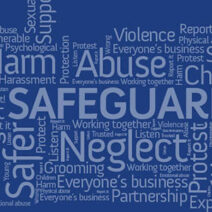Safeguarding children, young people and vulnerable adults
Our commitment
Wythenshawe Community Housing Group (“the Group”) is committed to creating and maintaining the safest possible environment for children, young people and vulnerable adults to access services and participate in activities.
Our policy
To help us do this we have a Safeguarding Policy. The policy applies to all tenants and families of Wythenshawe Community Housing Group and all users of the Group’s facilities or services. It also applies to young people who may take placements or work experience, apprenticeships or other forms of work training or volunteer programmes with WCHG. It applies to all colleagues and volunteers who work with, or come into contact with children, young people and vulnerable adults.
The policy aims:
- To create and maintain the safest possible environment for children, young people and vulnerable adults who access services or participate in activities provided by the Group or within Group owned or managed facilities and to recognise the Group’s responsibility to safeguard.
- To ensure that the Group’s staff are made aware of their responsibility to be vigilant about safeguarding issues, their own conduct, and how to respond to any concerns or suspicions they may have.
- To ensure a prompt and proportionate response when it appears that a child or young person or vulnerable adult may be at risk of abuse or neglect.
- To work with partner agencies and Manchester City Council to minimise risk and to ensure that where concerns are identified, they are swiftly and appropriately raised, and information is effectively shared.
- To ensure that the policy is publicised so that children, young people and vulnerable adults are aware of the Group’s approach and responsibilities.
- To comply with all relevant legislation and best practice.
What to do if you have a concern
If you have a concern about a child, young person or vulnerable adult who is in immediate danger or where a crime has been committed, call 999 immediately.
If you:
- have a concern about the welfare a child, young person or vulnerable adult who is not in immediate danger.
- have a concern about any of our facilities, services or activities for children, young people or vulnerable adults.
- need to complain about the behaviour of a member of our staff or a volunteer.
- would like to receive a copy of our full safeguarding policy.
Contact us on 0800 633 5500 or 0300 111 0000, or email us via our online form.
E-safety
E-Safety means ensuring that children, young people and vulnerable adults are protected from harm whilst using technology and the internet and that they achieve the maximum benefit from these without risk to themselves or others.
There are a number of steps that you can take to help improve your safety online:
DO
- Think before you post.
- Keep accounts private and restrict access and visibility to friends only.
- Be selective with your contacts on social media.
DON’T
- Think about turning on ‘preview’ tags on Facebook.
- Post/retweet/like comments or photos that are abusive, improper or offensive.
- Send or share images of yourself or others that are sexually explicit.
- Post comments that could be portrayed as committing an offence.
We have supported a group of local school pupils to make their own video about how to be a good online friend.
Up-to-date information and advice on how to keep yourself safe online can be found at http://h2bsafetycentre.com/
Safeguarding definitions
Children and young people are those below the age of 18 years.
Vulnerable adults:
- Are aged 18 years and over
- Are, or may be, in need of Community Care Services because of learning or physical disability, older age or physical or mental illness.
- Are, or may be, unable to take care of themselves, or unable to protect themselves from harm or exploitation by others.
Abuse is defined as: ‘a violation of an individual’s human and civil rights by any other person or persons. Abuse may be physical, psychological, sexual, emotional, financial, neglect or acts of omission. It may involve people taking money without permission, or not looking after someone properly.
It may include poor care practices, bullying or humiliating, or not allowing contact with friends and family. Abuse often involves criminal acts. Abuse can be a single act or may continue over a long period. It can be unintentional or deliberate, but will result in harm to the victim, either physically, emotionally or in its effect on the person’s wellbeing or development.
Abuse can take many forms including:
- Sexual (including sexting and child grooming).
- Physical.
- Emotional (including cyber-bullying).
- Psychological.
- Financial.
- Neglect.
- Discriminatory.
- Institutional.
E-Safety means ensuring that children, Young People and vulnerable adults are protected from harm whilst using technology and the internet and that they achieve the maximum benefit from these without risk to themselves or others.
Child grooming comprises actions deliberately undertaken with the aim of befriending and establishing an emotional connection with a child, to lower the child’s inhibitions in order to sexually abuse the child.
Cyber-bullying is the use of any technology, particularly mobile phones and the internet, to deliberately upset another person.
Sexting is the act of sending or sharing sexually explicit images/messages, primarily between mobile phones. It is illegal when it involves someone under 18.
Equality and Diversity
We recognise that customers of all races, ages, religions, gender, sexual orientation, literacy levels and disability should be treated equally and fairly.
We will provide information in languages other than English, in Braille, Large Print and Audiotape. Our receptions and interview rooms are fitted with a hearing loop system.
If you require assistance with translation of this statement, large print, braille, or an audio copy, contact us by phone on: 0300 111 0000 or: 0800 633 5500 or by email: communications@wchg.org.uk

